
Henry Scudder (d. 1659?) was an English minister of presbyterian views, known as a devotional writer, and member of the Westminster Assembly.

Henry Scudder (d. 1659?) was an English minister of presbyterian views, known as a devotional writer, and member of the Westminster Assembly.
He was a graduate of Christ's College, Cambridge, with a Cambridge Master of Arts (MA Cantab) from 1606. [1] He was minister at Drayton in Oxfordshire 1607–19, and in 1633 was presented by the king to the living of Collingbourne-Ducis, near Marlborough, Wiltshire. In June 1643 he was summoned to the Westminster Assembly of divines. When in June 1645 an order came from the House of Commons to pray for the forces, Scudder was one of the four preachers assigned to Aldgate. He was minister at the London church of St Mildred Poultry in 1645–6. [1] On 6 April 1647 he reported on some of the proofs of the Westminster Confession of Faith, and on 9 February 1648 his name was added to the Assembly's committee for the scriptures.
Scudder preached before the House of Commons in October 1644, on a fast day, at St. Margaret's, Westminster, and his sermon was printed by request of the house. He died before the Restoration, and his successor at Collingbourne-Ducis was instituted in 1660. He was buried in the church there, in a tomb that has been removed. He married Elizabeth, daughter of George Hunt, for fifty years rector of Collingbourne-Ducis. She died when little over twenty. Her sister married William Whately, Scudder's fellow student at Christ's College, and subsequently vicar of Banbury, whose life Scudder wrote in 1639–40. A daughter married John Grayle in 1645.
Scudder was author of a devotional work entitled The Christian's Daily Walke in Holy Securitie and Peace. The sixth edition, issued in 1635, has an 'Epistle to the Reader,' by John Davenport, dated from Coleman Street, 25 April 1627. The title-page describes it as first intended for private use. A German translation by Theodore Haak appeared at Frankfurt in 1636. The book was frequently reissued, The editions of 1690 and 1761 have commendations by John Owen and Richard Baxter. A fifteenth edition was issued in 1813. The edition of 1820, containing Davenport's epistle and Owen and Baxter's recommendations, has an introductory essay by Thomas Chalmers.
Scudder also published:
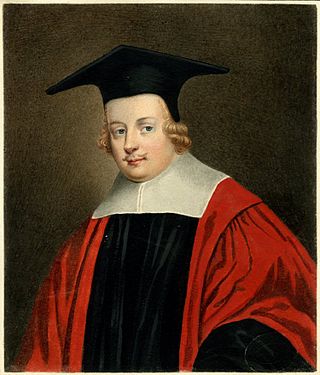
Henry Hammond was an English churchman, who supported the Royalist cause during the English Civil War.

George Gillespie was a Scottish theologian.

John Goodwin (1594–1665) was an English preacher, theologian and prolific author of significant books.
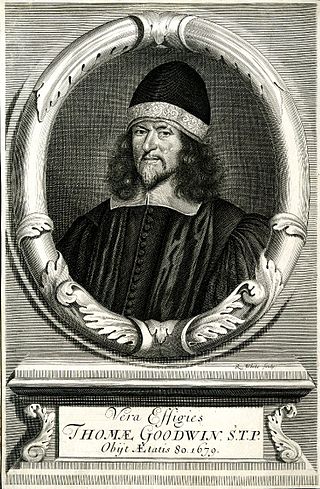
Thomas Goodwin, known as "the Elder", was an English Puritan theologian and preacher, and an important leader of religious Independents. He served as chaplain to Oliver Cromwell, and was appointed by Parliament as President of Magdalen College, Oxford, in 1650. Christopher Hill places Goodwin in the "main stream of Puritan thought".
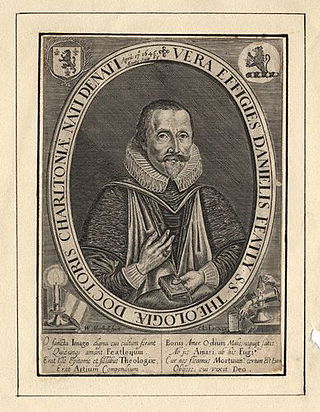
Daniel Featley, also called Fairclough and sometimes called Richard Fairclough/Featley, was an English theologian and controversialist. He fell into difficulties with Parliament due to his loyalty to Charles I of England in the 1640s, and he was harshly treated and imprisoned at the end of his life.

Philip Henry was an English Nonconformist clergyman and diarist. His son Matthew Henry was a notable commentator on the Bible and also a Presbyterian minister.
John Saltmarsh was an English religious radical, "One of the most gentle tongued of controversialists", writer and preacher. He supported the Covenant and was chaplain in Thomas Fairfax's army. The Dictionary of National Biography describes his theology as "Calvinistic in its base, but improved by practical knowledge of men". William Haller called him that strange genius, part poet and part whirling dervish. He preached Free Grace theology, and published on the topics of Peace, Love and Unity.
Anthony Burges or Burgess was a Nonconformist English clergyman, a prolific preacher and writer.
Richard Vines was an English clergyman, one of the Presbyterian leaders of the Westminster Assembly. He became Master of Pembroke Hall, Cambridge, from 1644 to 1650.

William Gouge (1575–1653) was an English Puritan clergyman and author. He was a minister and preacher at St Ann Blackfriars for 45 years, from 1608, and a member of the Westminster Assembly from 1643.

Samuel Bolton was an English clergyman and scholar, a member of the Westminster Assembly and Master of Christ's College, Cambridge.
Lazarus Seaman, was an English clergyman, supporter in the Westminster Assembly of the Presbyterian party, intruded Master of Peterhouse, Cambridge, and nonconformist minister.
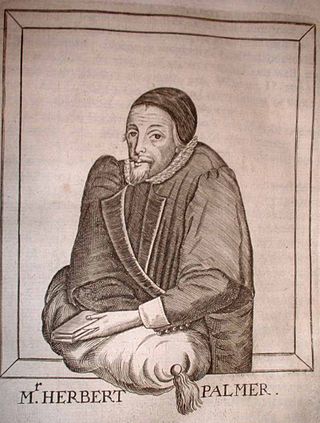
Herbert Palmer (1601–1647) was an English Puritan clergyman, member of the Westminster Assembly, and President of Queens' College, Cambridge. He is now remembered for his work on the Westminster Shorter Catechism, and as a leading opponent of John Milton's divorce tracts.
John Downame (Downham) (1571–1652) was an English Puritan clergyman and theologian in London, who came to prominence in the 1640s, when he worked closely with the Westminster Assembly. He is now remembered for his writings.
Henry Wilkinson (1610–1675) was an English clergyman, in the Commonwealth period a canon of Christ Church, Oxford, Lady Margaret Professor of Divinity, and member of the Westminster Assembly. Later he was a nonconformist preacher.
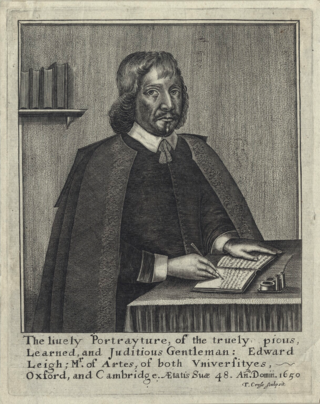
Sir Edward Leigh was an English lay writer, known particularly for his works on religious topics, and a politician who sat in the House of Commons from 1645 to 1648.

Adoniram Byfield or Bifield was an English clergyman, one of the scribes to the Westminster Assembly. The surviving minutes of the Assembly, which according to a project to have them published "arguably constitute the most important unpublished religious text of seventeenth-century Britain", run to over half a million words and are almost all in Byfield's writing.
Samuel Eaton (1596?–1665) was an English independent divine.

William Whately (1583–1639) was an English Puritan cleric and author.

Thomas Wadsworth (1630–1676) was an English presbyterian minister, an ejected nonconformist after 1662.